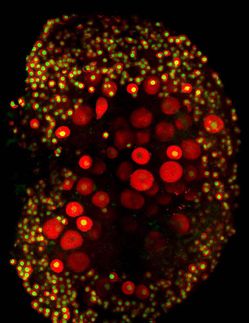Affymetrix Launches European Cytogenetic Research Initiative
Affymetrix Inc. announced the launch of the European Cytogenetic Research Initiative, a collaboration between Affymetrix, the University of Nijmegen in the Netherlands, the University of Tuebingen in Germany and the NHS Regional genetics Laboratory in Birmingham, U.K. The collaborators are using Affymetrix microarray technology to identify the specific causative mutations in mentally retarded children.
Currently, cytogeneticists use karyotyping and FISH technologies to understand how deletions, amplifications and other chromosomal rearrangements lead to congenital abnormalities and mental retardation in children. The Affymetrix microarray platform provides a higher-resolution view of the genome than traditional cytogenetic solutions, enabling researchers to better identify causative mutations, copy number variants and loss of heterozygosity (LOH) information.
"Each year up to 30,000 children with learning difficulties will be tested in the U.K. alone using karyotyping and targeted FISH methods, and these technologies are only helping to resolve 5 to 10 percent of cases," said Dominic McMullan, Ph.D., head of molecular cytogenetics, NHS Regional Genetics Laboratory.
"Affymetrix GeneChip(R) technology provides industry-leading copy number resolution and LOH information," said Olaf Riess, M.D., head of the department for medical genetics, University of Tuebingen. "With this technology, we expect to find a much higher number of causal de novo deletions and amplifications than we could with the current gold-standard methods like karyotyping."
"Our laboratory has extensive experience in using homemade 32K BAC arrays in the cytogenetic analysis of children with unexplained mental retardation," said Joris A. Veltman, Ph.D., head of the microarray facility, University of Nijmegen. "We selected the Affymetrix technology because the GeneChip SNP Array platform provides a higher-resolution view of copy number variations, enabling us to improve our cytogenetic efforts to better understand mental retardation."
Organizations
Other news from the department science

Get the life science industry in your inbox
By submitting this form you agree that LUMITOS AG will send you the newsletter(s) selected above by email. Your data will not be passed on to third parties. Your data will be stored and processed in accordance with our data protection regulations. LUMITOS may contact you by email for the purpose of advertising or market and opinion surveys. You can revoke your consent at any time without giving reasons to LUMITOS AG, Ernst-Augustin-Str. 2, 12489 Berlin, Germany or by e-mail at revoke@lumitos.com with effect for the future. In addition, each email contains a link to unsubscribe from the corresponding newsletter.


















































